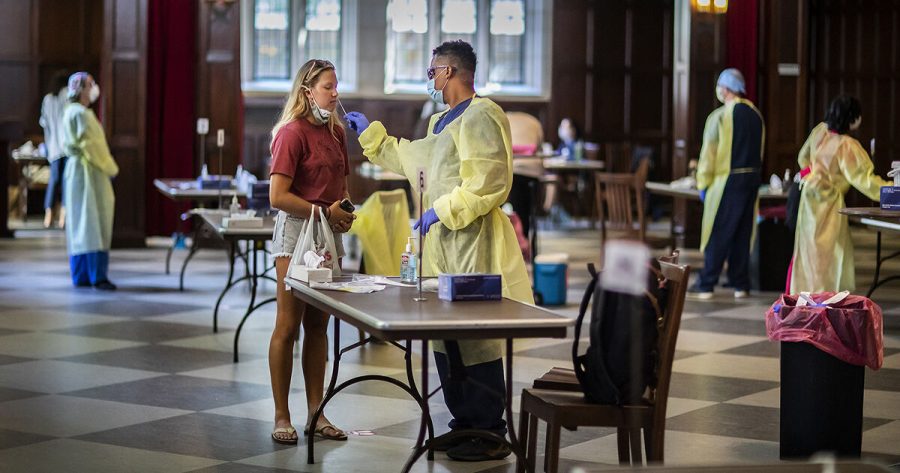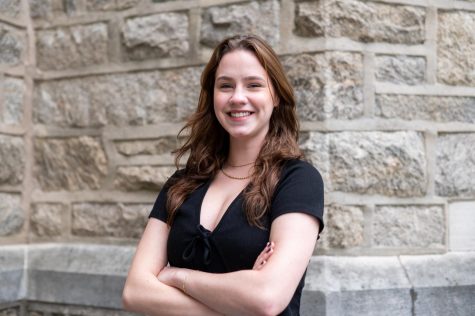Philadelphia Universities Take Similar Directives to Fight COVID-19
A University of Pennsylvania student receives her COVID test.
March 3, 2021
Coming back to campus for the spring semester has been a challenging yet rewarding experience for students, staff and administration across universities in the United States. Philadelphia schools are especially faced with difficulty, as being located in a major city reflects more likelihood of COVID-19 spreading. The University was fortunate to have a safe and complete fall semester and has already overcome COVID-19 spikes this semester.
Schools located within Philadelphia, including the University of Pennsylvania, St. Joseph’s University and Temple University, have also set plans to allow for a safe and healthy spring semester.
For the University of Pennsylvania, students were completely virtual during Fall 2020. This spring, classes within the school’s nursing program and hard-science labs are among the only classes permitted to meet in-person. Sophomore Allegra Greenawalt is excited to be back on campus but wishes the university would organize more classes to be conducted in-person.
“I would love to see more students in the classroom,” Greenawalt said. “I have seen other schools making it work safely and I believe smaller seminars could easily be held in-person.”
In addition to the strict limitations of in-person class, the University of Pennsylvania has an avid COVID-testing program for students living on campus. Students are required to be tested at least twice a week and face penalties for failing to participate. The school has utilized a system called “PennOpen Pass,” in which students track their daily symptoms, sign up for testing and schedule times for library or gym time. If students have followed guidelines properly, their pass is green for 24 hours and they can enter campus buildings. However, a red pass indicates essential steps were missed on a day, and entry to buildings is prohibited.
Students living on campus are all in singles and have a “pod” where they share a bathroom among a small number of students. The University also has a building for students to quarantine if they are contact-traced and has a separate building for COVID-19 positive students.
“Students who have been exposed automatically receive 10 days of a red pass for every person they have been exposed to,” Greenawalt explained. “So, if you are exposed to three students, your pass will stay red for 30 days.”
The University of Pennsylvania has taken strict precautions yet have already dealt with a high positivity rate this semester, peaking at around 5%.
St. Joseph’s University completed its fall semester in a hybrid format, offering in-person and online class. It has welcomed back students in the spring. Among the strictest guidelines in place are the capacity limits within dorms. The University asks students to have no more than two outside students in their rooms at any time. Also, students are only allowed access to their residence halls and may not enter others. Suites were offered where six to 12 students can live together, but masks are required in common areas and bathrooms within the suite.
Dining halls only offer grab-and-go options for the time being. Also, all indoor activities besides class have been prohibited. Similar to Villanova, St. Joseph’s University has promoted a handful of outdoor activities to keep students occupied during the weekends.
Another similar program that St. Joseph’s has in place is its surveillance testing program. Students are selected randomly in order to monitor asymptomatic cases of COVID-19.
Sophomore Nick Manzi has praised the University for the precautions taken.
“We are fortunate to be on-campus and not experience any pauses this or last semester,” Manzi said. “There is bound to be risk with students on campus, but the school is doing its best to keep everyone safe. RAs are doing a great job to uphold community standards.”
Manzi was in quarantine last semester and shared that the accommodations were up to par. The hotel rooms include a king-sized bed, kitchenette, TV and living room. The school catered breakfast while Good Uncle served lunch and dinner.
“The hotel is utilized for contact tracing, while students who tested positive go to one of two residence halls,” Manzi explained.
Temple University had limited in-person instruction in the fall and went on a pause after three weeks due to COVID-19 spikes. A majority of students selected to go completely virtual after and refunds were given for housing and meal plans. In the spring semester, only a small percentage of the student body returned to campus. The school aimed to offer 20% of their classes in-person, compared to the five percent in the fall. Despite this attempt, the majority of Temple’s students are completely remote. Freshman Aoife Burke is among this majority.
“I am living on campus this semester but still only have virtual classes,” Burke said. “I know a lot of students also 100% online and despite students’ efforts to get in-person classes on their schedule, many could not find any options.”
All student organizations have also been subjected to being completely virtual.
Similar to St. Joseph’s University, dining halls only have take-out options and residence halls are only open to the students who live within them.
While on campus, students are required to get tested twice a week, similar to the University of Pennsylvania. Temple University, though, has testing available for off campus students who take in-person class as well.
Furthermore, the school has cancelled Spring Break and implemented two “wellness days” in the semester.
“I think the guidelines are fine, but I wish the school had better resources for the students’ care more in general,” Burke said. “I think there should be more focus on mental health because obviously it is extremely hard being a college student in a pandemic.”
As Philadelphia universities continue to navigate this semester, guidelines remain in trend with one another.



